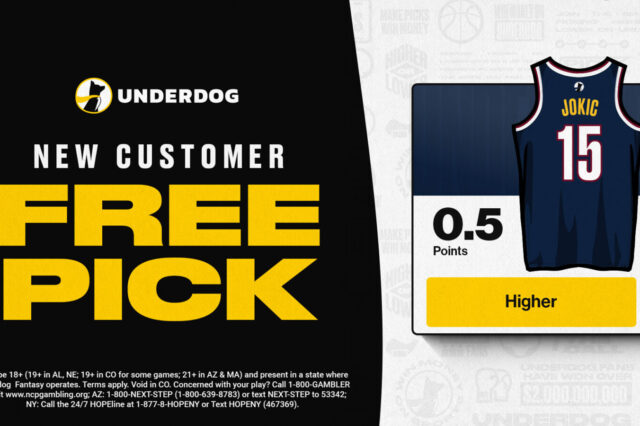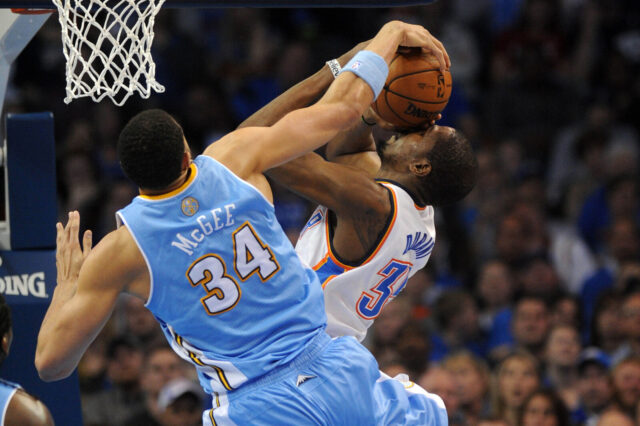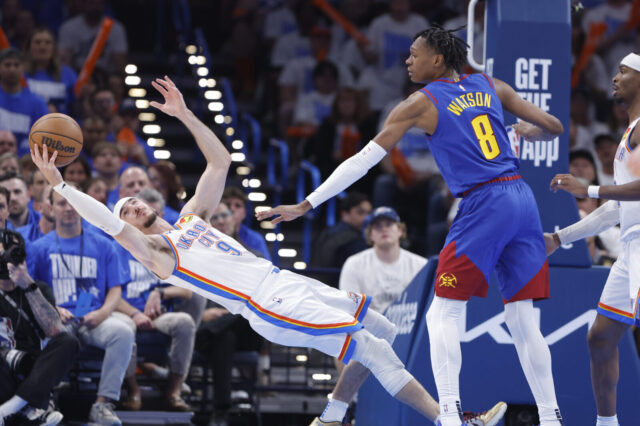The Denver Nuggets knew after Jerami Grant departed during the 2020 offseason that they were operating at a major disadvantage during the beginning of the 2020-21 season. A team with very few athletic forward options ready to contribute at a high level, the Nuggets made the most of their situation, often going small and playing two, three, sometimes even four guards at the same time. Something had to change, and at the 2021 trade deadline in late March, the Nuggets acquired Orlando Magic forward Aaron Gordon.
Gordon offered the Nuggets a versatile skill set during the remainder of the regular season and the playoffs. His willingness to play hard and ability to offer impact without scoring helped elevate the Nuggets to championship contention status for a short while. Though things didn’t work out in the playoffs, the Nuggets certainly benefitted from acquiring Gordon in March.
Aaron Gordon 2020-21 per game stats
| Team | Games | Minutes | Points | Rebounds | Assists | Turnovers | 2-point % | 3-point % | True Shooting % |
|---|---|---|---|---|---|---|---|---|---|
| Orlando | 25 | 29.4 | 14.6 | 6.6 | 4.2 | 2.7 | 47.5 | 37.5 | 53.7 |
| Denver | 25 | 25.9 | 10.2 | 4.7 | 2.2 | 1.2 | 60.6 | 26.6 | 56.4 |
What Happened
After the Nuggets acquired Gordon in late March, Denver’s starting lineup of Jamal Murray, Will Barton, Michael Porter Jr., Gordon, and Nikola Jokić was one of the strongest in the NBA. Gordon was a major part of that. His athleticism as a defender, rebounder, and cutter gave the Nuggets a significant boost. He was the player the Nuggets needed to tie together their skilled playmakers and shooters already in place, and he fit seamlessly with Jokić upon arrival.
After Murray’s injury, and Gordon’s effectiveness within his role took a left turn. The Nuggets didn’t ask him to do too much more, but Gordon’s shooting fell off after Murray went down, and his minutes were relatively sporadic as head coach Michael Malone tried to get him up to speed quickly.
In the playoffs, Gordon had strong moments as a defender against Damian Lillard, CJ McCollum, and Devin Booker. His three-point shooting returned to him during the series against the Blazers, shooting 60% and helping the Nuggets advance. Still, the Nuggets were left needing more from him to advance further as he averaged 9.0 points per game against the Suns in the second round and didn’t make a three-pointer.
Best Moment — Matching up with Kawhi Leonard
Gordon’s performance against the Los Angeles Clippers on April 1st was exactly what the Nuggets needed to grow more excited about their future. In 38 minutes, Gordon scored 14 points on 13 shots, dished out six assists, grabbed six rebounds, and added three steals and two blocks while guarding Kawhi Leonard and Paul George. The Nuggets won that game definitively, and it showcased Gordon’s ability to match up with big wings around the NBA, something they had struggled with before. This was Denver’s biggest question on the way to title contention. (91 words)
Player Grade — B+
When the Nuggets acquired Gordon, they never expected to be without Murray, Barton AND P.J. Dozier for long periods of time in the playoffs. Gordon was asked to do a lot in replacing him, and that may have put an unfair burden of expectations upon his arrival. Denver didn’t bring him in to be their savior, rather the final piece.
This isn’t an A level grade because of how Gordon struggled in the playoffs to adapt to Denver’s offensive disadvantages. He never elevated his game. The Nuggets needed another level offensively and it just never happened.
Offseason Outlook
With Jokić and Murray both locked up on max contracts, Denver’s next order of business is discussing contract extensions with Porter and Gordon. Porter will likely be offered a max rookie extension, while the negotiations surrounding Gordon’s contract are more nuanced. Jerami Grant signed a three-year, $60 million contract last offseason, while other forwards around Gordon’s age and impact level have contracts ranging from $16 million (Davis Bertans) to over $21 million (Harrison Barnes) in annual money. There’s (likely) no reason for Gordon to sign a contract extension that doesn’t at least fall into that general range.
The Nuggets must decide how much they can afford to offer Gordon, given their impending financial commitment to Porter as well as filling other holes on their roster. How highly do they value his services? How far can they go into the luxury tax to keep the roster together? These are important questions to answer before approaching Gordon. If the Nuggets and Gordon cannot agree to an extension this offseason, it’s most likely due to financial restraints or if the two sides are far away on Gordon’s actual value.
This will be a very interesting offseason for Gordon and the Nuggets.


